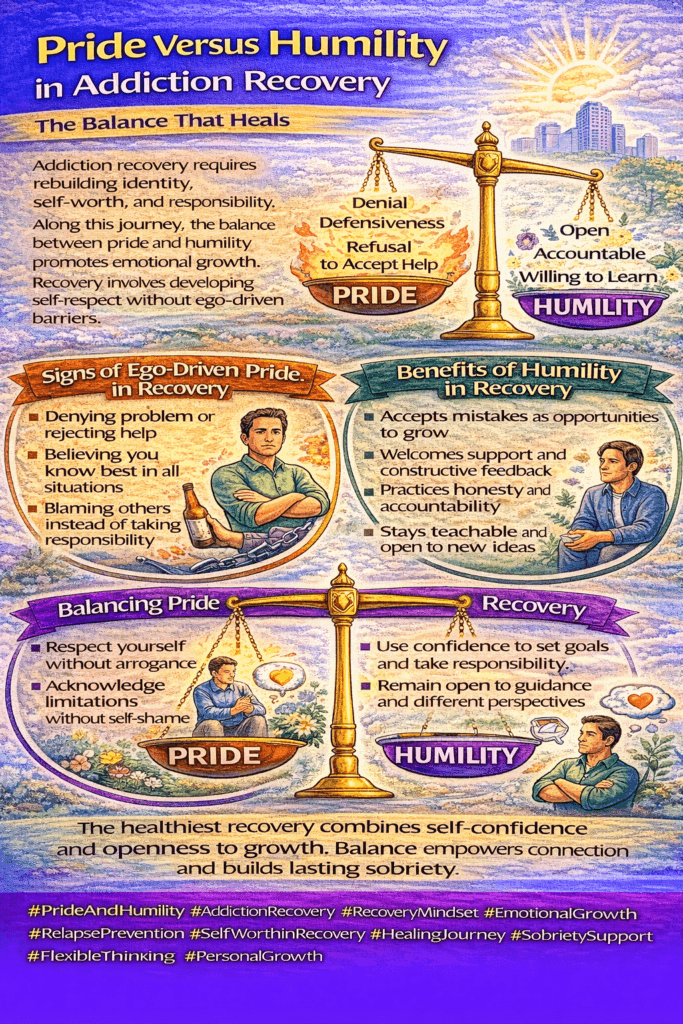In addiction recovery, pride and humility play pivotal roles, with pride often hindering progress while humility fosters growth. Recognizing the detrimental effects of pride, individuals can take steps to cultivate humility. This involves self-management strategies, family support, and community resources that foster introspection, understanding, and connection. By embracing humility, individuals can navigate recovery with resilience and support.
The Role of Pride and Humility in Addiction Recovery
In addiction recovery, pride and humility represent two distinct mindsets that profoundly influence the path to sobriety. Pride, marked by arrogance and denial, often obstructs progress. It fuels denial, resistance to change, and defensiveness, making it hard for individuals to acknowledge their addiction’s impact. Pride can lead to isolation, reluctance to accept support, and refusal to embrace the changes needed for recovery.
Conversely, humility allows individuals to recognize their limitations, learn from mistakes, and seek support. By accepting vulnerability, humility fosters self-awareness and accountability, laying a foundation for lasting recovery. This openness fosters resilience, making it easier to navigate challenges and maintain sobriety.
Pride Actions That Hinder Recovery
- Denial: Pride may drive denial, obscuring the need for help.
- Resistance to Treatment: A prideful mindset can prevent individuals from seeking professional help.
- Defensiveness: Pride often triggers defensiveness against feedback, limiting personal growth.
- Isolation: Prideful individuals may withdraw, missing out on essential support networks.
- Refusal to Change: Pride can prevent individuals from addressing essential issues in recovery.
- Reluctance to Accept Support: Pride may hinder the acceptance of external support, blocking growth opportunities.
Embracing humility over pride allows individuals to welcome support, confront underlying issues, and build a resilient foundation for long-term recovery. This mindset shift encourages a fulfilling life in sobriety, sustained by self-awareness, support, and the willingness to grow.
Self-Management Strategies to Alleviate Pride and Cultivate Humility in Addiction Recovery
Cultivating humility is essential in addiction recovery, as pride often becomes a barrier to progress. By embracing humility, individuals foster self-awareness, openness, and resilience, enabling a more authentic and sustainable recovery journey. Here are some effective self-management strategies to help reduce pride and build humility:
- Practice Self-Reflection: Regularly set aside time to assess your attitudes and behaviors related to recovery. Reflect on areas where pride might limit your growth, and identify steps to build humility.
- Embrace Vulnerability: Share your challenges, fears, and successes openly with others. Recognizing that vulnerability strengthens, rather than weakens, connection can lead to more supportive and trusting relationships.
- Accept Feedback: Approach feedback from peers, mentors, or professionals with an open mind. Use it to fuel personal growth, avoiding defensive responses that might hold you back.
- Let Go of Perfectionism: Accept that the recovery journey includes setbacks. Practice self-compassion by recognizing mistakes as opportunities to learn rather than failures.
- Seek Support: Reach out to family, friends, or recovery groups for guidance and encouragement. Be open to receiving support and make asking for help part of your recovery toolkit.
- Cultivate Gratitude: Reflect daily on things you’re grateful for, even small victories. This practice shifts focus from ego to appreciation for the recovery support around you.
- Set Realistic Goals: Establish achievable goals for your journey, focusing on personal progress rather than comparison. Celebrating small victories reinforces growth and resilience.
- Practice Active Listening: Engage in conversations with full attention and empathy. Active listening fosters respect and openness to other perspectives, reducing self-centered tendencies.
By integrating these strategies, individuals can ease pride and build humility, empowering a more resilient, growth-oriented approach to addiction recovery. Humility encourages acceptance, connection, and a balanced, self-aware mindset—critical elements for sustained progress and personal fulfillment on the path to sobriety.
Family Support Strategies to Alleviate Pride and Foster Humility in Addiction Recovery
Family support is essential in addiction recovery, as it can help diminish pride and cultivate humility—critical elements for lasting change. Here are effective family strategies for fostering a humble, growth-oriented recovery environment:
- Foster Open Communication: Encourage a safe, non-judgmental space for open conversations. Honest communication about thoughts, feelings, and challenges related to addiction can reduce defensiveness and build mutual understanding.
- Offer Unconditional Love and Acceptance: Reassure the individual that their addiction doesn’t define their value. Express empathy, compassion, and patience, reinforcing that they’re supported in their journey.
- Set Healthy Boundaries: Establish consistent behavior, recovery goals, and expectations. Communicate boundaries with understanding, offering guidance and support without enabling destructive patterns.
- Lead by Example: Model humility by admitting your own mistakes and demonstrating openness to feedback. Showing vulnerability can encourage individuals to adopt the same mindset in their recovery process.
- Encourage Accountability: Hold the person in recovery accountable for their actions while recognizing their progress. Offer supportive guidance to reinforce responsible choices without enabling unhealthy behaviors.
- Provide Practical Support: Offer assistance with practical needs, such as transportation to therapy sessions or help with daily responsibilities. Engaging in recovery-related activities together shows shared commitment and understanding.
- Participate in Family Therapy: Family therapy can address deeper issues, improve communication, and strengthen bonds. Working with a professional can provide the family with tools to support the individual’s recovery more effectively.
- Celebrate Progress: Acknowledge and celebrate even small achievements, reinforcing motivation and encouraging humility. Recognize the hard work involved in their journey and express pride in their growth.
- Practice Forgiveness: Embrace forgiveness for past mistakes. Encourage self-forgiveness and promote a forgiving atmosphere within the family as a foundation for healing.
- Offer Emotional Support: Be a source of emotional support during challenging times. Show empathy, validate their experiences, and provide a compassionate, steady presence.
By implementing these strategies, families can help reduce pride and foster humility, creating a supportive, nurturing environment for long-term recovery. This balanced approach encourages accountability, resilience, and a healthier family dynamic, contributing to sustained recovery and growth.
Community Resource Strategies to Alleviate Pride and Foster Humility in Addiction Recovery
In addiction recovery, community resources can play a vital role in helping individuals alleviate pride and foster humility. These resources offer support, guidance, and opportunities for personal growth while assisting individuals to stay accountable and connected. Here are some effective community resource strategies for supporting humility in recovery:
- Support Groups: Encourage participation in groups such as Alcoholics Anonymous (AA), Narcotics Anonymous (NA), or SMART Recovery. These groups provide a safe space for individuals to share their experiences, offer mutual support, and gain insights from others who understand the recovery journey.
- Counseling and Therapy Services: Connect individuals with community-based counseling or therapy services specializing in addiction recovery. These services offer individual or group therapy, providing a safe space to explore underlying issues and develop healthier coping strategies.
- Peer Support Programs: Support peer-led programs that pair individuals with others who have successfully overcome addiction. Peer support offers practical advice, encouragement, and shared experiences to help individuals navigate recovery challenges.
- Recovery Community Centers: Direct individuals to local recovery community centers that offer a range of resources and services, including peer support groups, wellness workshops, and social events. These centers create a welcoming environment for individuals to engage in their recovery while building connections.
- Online Resources: Provide access to online tools, forums, and websites that offer valuable information, resources, and support. Online communities and apps can connect individuals with others in recovery and guide them in maintaining sobriety.
- Vocational and Employment Programs: Help individuals connect with vocational and employment programs that support recovery by providing job training, employment opportunities, and career development resources. These programs foster a sense of purpose and responsibility in recovery.
- Community Wellness Activities: Encourage participation in local wellness activities such as yoga, meditation, fitness programs, or recreational sports. These activities promote mental and physical well-being while offering opportunities for social support and connection.
- Faith-Based Organizations: Consider joining faith-based organizations that offer spiritual guidance, counseling services, and recovery support groups. These organizations offer a sense of community and belonging that can be especially meaningful in the recovery process.
- Volunteer Opportunities: Facilitate opportunities for individuals to volunteer or participate in community service projects. Giving back to others can help individuals cultivate humility and a sense of purpose and strengthen their connections within the recovery community.
- Recovery Advocacy Groups: Encourage involvement in recovery advocacy groups that raise awareness about addiction and promote supportive policies. These groups offer opportunities for leadership, involvement, and advocacy within the recovery community.
By engaging with these community resources, individuals in recovery can build a strong support network, access valuable services, and embrace a sense of humility that fosters long-term healing and personal growth.
Frequently Asked Questions
Here are some common questions:
What does pride mean in addiction recovery?
Pride in recovery refers to self-confidence and self-respect, but it can become harmful when it turns into denial, defensiveness, or refusal to accept help.
Why can pride be a barrier to recovery?
Excessive pride may cause individuals to deny addiction, reject support, resist feedback, or believe they can recover alone, increasing relapse risk.
What is humility in recovery?
Humility is the ability to recognize personal limitations, accept help, stay open to learning, and take honest responsibility for actions.
Does humility mean weakness in recovery?
No. Humility is a strength that allows growth, connection, and adaptability. It supports accountability and long-term healing.
Can too much humility be harmful?
Yes. Extreme humility can turn into self-shame or low self-worth. Healthy recovery requires balanced self-respect alongside openness.
How do pride and humility work together in recovery?
Healthy pride builds confidence and independence, while humility keeps individuals open to support and learning. A balance between both supports a stable recovery.
How do recovery programs encourage humility?
Support groups, therapy, and peer feedback promote honesty, self-reflection, and willingness to accept guidance.
Can pride ever be helpful in recovery?
Yes. Positive pride reinforces motivation, celebrates progress, and strengthens belief in one’s ability to maintain sobriety.
How can someone recognize unhealthy pride in recovery?
Signs include rejecting advice, avoiding meetings or therapy, blaming others, or refusing to admit struggles.
What helps develop balance between pride and humility?
Therapy, peer support, self-reflection, and mindfulness practices help individuals build self-respect while staying open to growth.
Conclusion
The interplay between pride and humility profoundly shapes the journey of addiction recovery. Pride, with its tendencies towards defensiveness and isolation, can serve as a barrier to progress. Conversely, humility, marked by openness and a willingness to seek support, fosters growth and resilience. Individuals can embark on a healing path by recognizing the harmful effects of pride and actively cultivating humility. Self-management strategies, family support, and community resources provide essential tools for this transformation. Together, these elements form a holistic approach to addiction recovery, guiding individuals toward a future of sobriety, connection, and well-being.
Video:

